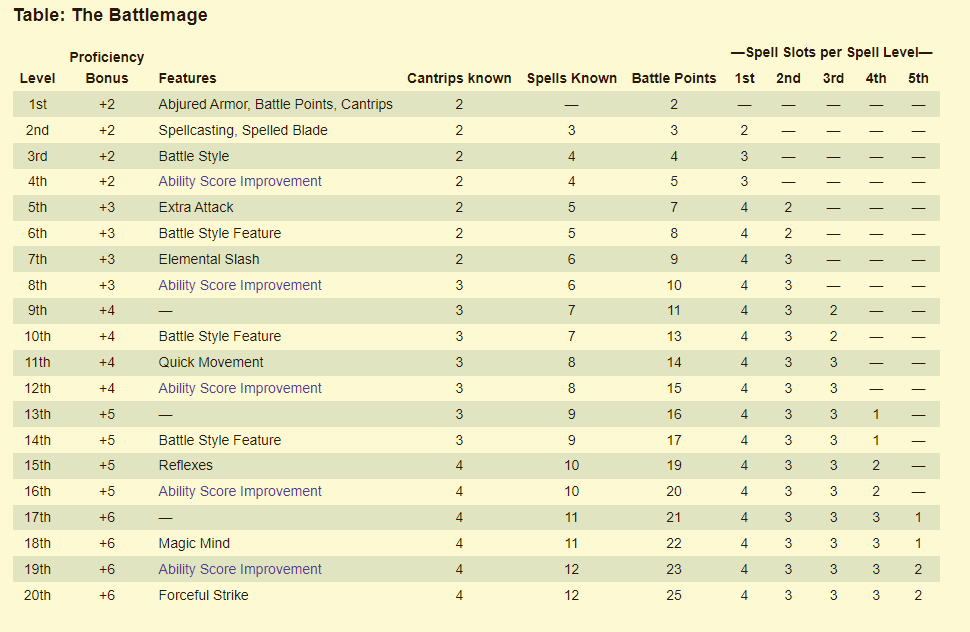Battle Mage (5e Subclass)
Battlemage[edit]
Fighter subclass
There once was an unrivaled martial artist whose might and cunning in battle were without equal. One day, this fighter was approached by another warrior who challenged the martial artist to a duel. The martial artist accepted, only to be baffled by the warrior who ran from him and cast spells. After several minutes of fighting, the martial artist lost to the unnamed warrior and learned that even with unrivaled might and intellect, they could still lose to another. Soon afterwards, the martial artist pledged to focus on both magic and martial prowess, so they would never be outdone again. Henceforth, the people who followed this path became known as battlemages. These battlemages soon became known for crushing their foes with their might and slaughtering them with magic. Battlemages have since become a boon to have on the battlefield because of their versatility and reliability.
Abjured Armor[edit]
At 1st level, you can use a bonus action to summon ethereal armor for 4 hours. While you are wearing no armor, your AC is 10 + Dexterity modifier + Intelligence modifier. Once you use this feature, you can not use it again until you finish a long rest, or you may spend 1 battle point to reuse abjured armor.
Battle Points[edit]
Beginning at 1st level, you are trained in the use of battle magic and may spend battle points for different features. The Battle Points column on the Battlemage Table shows how many points you have at each level. In addition, you regain a number of battle points equal to your Intelligence modifier(minimum 1) after you finish a short rest. You regain all your battle points when you finish a long rest.
Cantrips[edit]
At 1st level, you know two cantrips of your choice from the sorcerer spell list. You learn additional battlemage cantrips of your choice at higher levels, as shown in the Cantrips Known column of The Battlemage table.
Spellcasting[edit]
At 2nd level, you have gained the ability to use arcane magic, and have learned how to bend it to your will.
- Spell Slots
The Battlemage Table shows how many spell slots you have to cast your spells of 1st level and higher. To cast one of these battlemage spells, you must expend a slot of the spell's level or higher. You regain all expended spell slots when you finish a long rest.
For example, if you know the 1st-level spell magic missile and have a 1st-level and a 2nd-level spell slot available, you can cast magic missile using either slot.
- Spells Known of 1st Level and Higher
You know three 1st-level spells of your choice from the sorcerer spell list.
The Spells Known column of the Battlemage Table shows when you learn more battlemage spells of your choice from the sorcerer spell list. Each of these spells must of a level where you have spell slots. For instance, when you reach 5th level in this class, you can learn one new spell of 1st or 2nd level.
- Spellcasting Ability
Intelligence is your spellcasting ability for your battlemage spells, since the power of your magic relies on your intellect. You use your Intelligence whenever a spell refers to your spellcasting ability. In addition, you use your Intelligence modifier when setting the saving throw DC for a battlemage spell you cast and when making an attack roll with one.
Spell save DC = 8 + your proficiency bonus + your Intelligence modifier
Spell attack modifier = your proficiency bonus + your Intelligence modifier
- Spellcasting Focus
You can use a melee martial weapon as a spellcasting focus for your battlemage spells.
Spelled Blade[edit]
At 2nd level, battlemages can use an action to cast a spell at its lowest level into a melee weapon by spending a number of battle points equal to the spell level. A weapon can have a number of spells in it equal to half your Intelligence modifier(minimum 1) rounded up. When you hit a creature with a melee weapon attack, you may release a spell on your target (if the spell naturally requires a ranged attack when cast, you still are required to make a ranged attack roll). Only one spell may be released during an attack action.
Ability Score Improvement[edit]
When you reach 4th level, and again at 8th, 12th, 16th and 19th level, you can increase one ability score of your choice by 2, or you can increase two ability scores of your choice by 1. As normal, you can't increase an ability score above 20 using this feature.
Elemental Slash[edit]
At 7th level, you have mastered the art of imbuing your weapon attacks with elemental magic. You may spend 5 battle points to add 3d6 fire, cold, or lightning damage to your attack. You can declare a use of elemental slash after the attack hits.
Quick Movement[edit]
At 11th level, moving through nonmagical difficult terrain costs you no extra movement. You can also pass through nonmagical terrain without being slowed by it and without taking damage from it if they have thorns, spines, or a similar hazard. You may also use 1 battle point to take the dash or disengage action as a bonus action.
Reflexes[edit]
At 15th level, you become extremely hard to fight due to your unnatural speed. When a creature you can see or hear attacks you, you can use your reaction and 3 battle points to make attacks from that creature roll with disadvantage when attacking you. If the creature misses an attack against you, in the same reaction you can counter attack, making one melee attack against that creature.
Magic Mind[edit]
At 18th level, your mind has become quick and complicated and has become impenetrable to outside influence. You are now considered immune to the charmed and frightened conditions. You may also spend 1 battle point to gain advantage on a saving throw from enchantment or illusion spell before the outcome of a roll has been determined.
Forceful Strike[edit]
At 20th level, as an action, you may spend 10 battle points to make a melee attack infused with radiant energy against a creature. On hit, your attack deals an additional 5d10 force damage.
Back to Main Page → 5e Homebrew → Character Options → Subclasses

